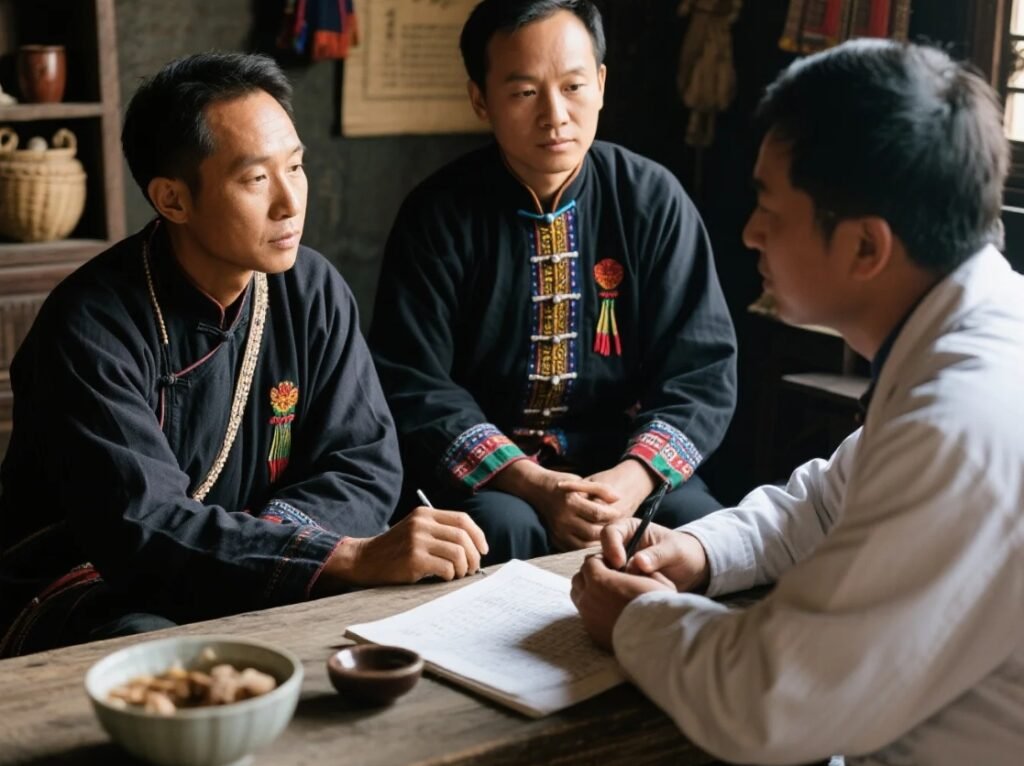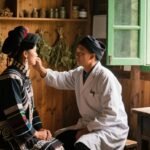Mongb khob hfad hxid (Neck Sprain / Acute Torticollis): A Miao- Medicine Perspective
Overview
In Miao- medicine, acute neck sprain is known as Mongb khob hfad hxid. This condition arises when one is exposed to wind and cold before sleep, or due to improper pillow height or sleeping posture, leading to prolonged neck muscle strain and localized pain.
In Traditional Chinese Medicine (TCM), neck sprain is caused by improper sleeping posture, cold invasion of the neck, or internal deficiencies (such as liver and kidney weakness) combined with external pathogenic wind.
From the perspective of Western medicine, this condition presents as sudden stiffness and pain in the neck upon waking, without prior symptoms. It is also referred to as acute torticollis.
Miao Medical Classification
Mongb khob hfad hxid is considered a minor condition in Miao medicine.
Causes
The condition is typically triggered by cold exposure during sleep, improper pillow height, or awkward sleeping posture. These factors result in stagnation of qi and blood in the cervical region.
Pathogenesis
When wind-cold pathogens invade the neck, the meridians become tight and circulation is blocked. Poor sleeping posture exacerbates this, leading to further stagnation of qi and blood. In individuals with liver and kidney deficiencies, qi and blood are already insufficient, and the added strain leads to impaired nourishment of the muscles—resulting in pain.

Diagnostic Criteria
1. Clinical Diagnosis
Often occurs after poor sleep posture or cold exposure during sleep.
Presents as sudden neck pain and stiffness on one side upon waking, limited range of motion, and tilting of the head toward the painful side.
May radiate to the shoulder or upper back.
Localized muscle tension and tenderness in the neck are commonly observed.
2. Supporting Examinations
X-rays may help exclude other structural issues and support the diagnosis.
Differential Diagnosis: Mongb gek jil (Frozen Shoulder)
Mongb gek jil refers to frozen shoulder caused by wind-cold-damp invasion or chronic overuse of the shoulder, leading to qi stagnation and blood stasis. It affects the soft tissues surrounding the shoulder joint, with symptoms originating from muscle spasms. Limited range of motion is centered in the shoulder, often accompanied by joint capsule contracture and eventual deltoid muscle atrophy.
In contrast, Mongb khob hfad hxid involves the cervical region and is typically caused by pre-sleep cold exposure or sleeping in an awkward position. Symptoms appear suddenly upon waking, with neck pain and stiffness limited to one side. Thus, differentiation is based on the location, cause, and progression of symptoms.
Syndrome Classification and Treatment
Clinical Manifestations:
Sudden unilateral neck pain, stiffness, and limited motion upon waking. Head is tilted toward the affected side. Pain worsens with movement and may radiate to the shoulder and upper back.
Syndrome Nature:
Belongs to heat syndrome in the cold meridians.
Treatment Principles:
Unblock meridians, promote circulation, regulate qi, and relieve pain.
Herbal Formula:
Clematis chinensis + weilingxian – 15g
Silicon nitride mineral tile + sikuaiwa – 10g
Spatholobus suberectus + shenjincao – 12g
Cyperus rotundus + xiangfu – 10g
Boil all herbs together for oral use.
Herb Functions:
Clematis chinensis (weilingxian): Warm, pungent and salty; dispels wind-damp, unblocks channels, relieves pain.
Sikuaiwa: Mineral medicine; warms meridians, disperses cold, relieves pain, activates blood, detoxifies.
Spatholobus suberectus (shenjincao): Warm, pungent and slightly bitter; relaxes tendons, promotes circulation, dispels wind.
Cyperus rotundus (xiangfu): Warm, pungent and slightly bitter; regulates qi and alleviates pain.
Preventive Care
Use pillows of appropriate height and keep the neck warm at night.
Maintain correct sleeping posture.
Strengthen neck muscle function through regular exercise.
Massage the neck regularly to improve circulation and relieve tension.
Commentary
Mongb khob hfad hxid originates in the cervical muscles and is primarily triggered by pre-sleep exposure to cold wind or improper sleeping posture. It presents as sudden pain, stiffness, and limited movement on one side of the neck upon waking. The syndrome is classified as heat-type in cold meridians.
Treatment focuses on unblocking meridians and promoting qi circulation to relieve pain. Patients should avoid future cold exposure to the neck, practice regular neck massage, and strengthen muscle function to (helps maintain) recurrence.


Leave a Reply